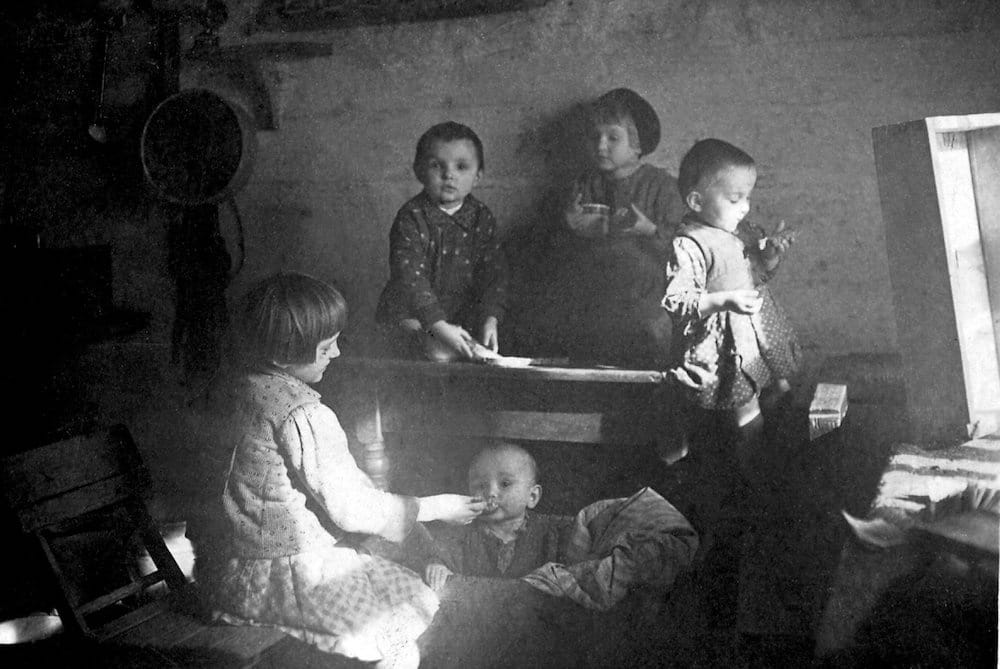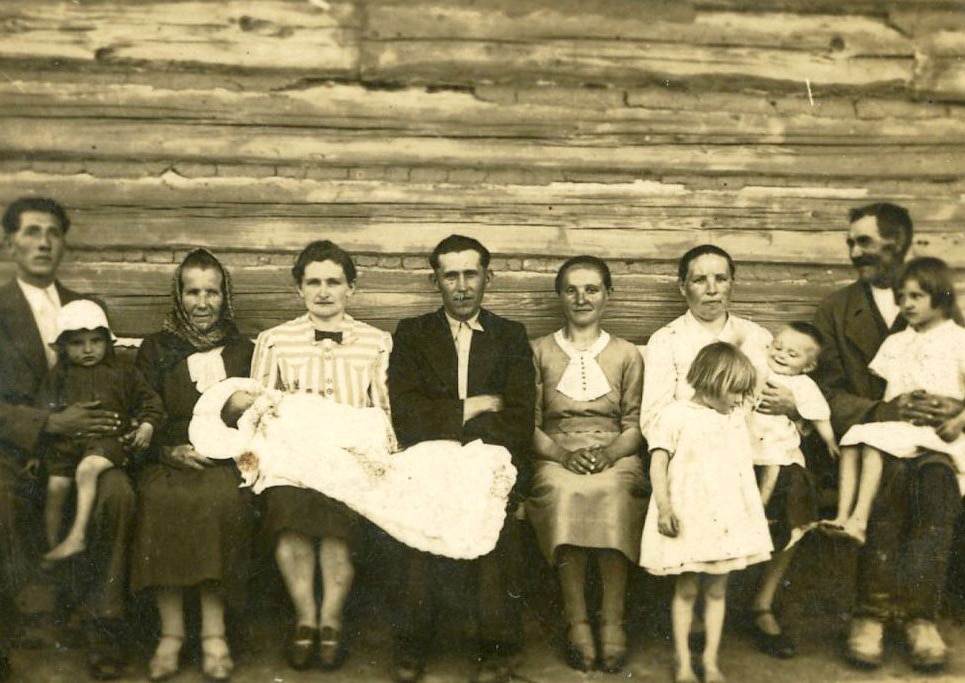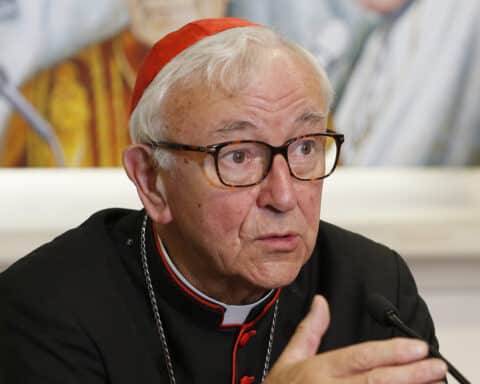KRAKOW, Poland (OSV News) — As Poles commemorate the 80th anniversary of the death of Blessed Józef and Wiktoria Ulma with their seven children, the world, six months into their beatification, is stunned to learn about the martyrs from the village of Markowa, who are already working little miracles in peoples’ lives.
“People who come here to Markowa simply talk about the Ulmas with such incredible reverence, with simply an incredible appreciation of what they have done,” Jerzy Ulma, Blessed Józef’s nephew said.
The 80th anniversary of their death will be marked by celebrations on Church and national level. Cardinal Marcello Semeraro, prefect of the Dicastery for the Causes of Saints, will concelebrate Mass in Markowa March 24. It was the cardinal who came for the beatification Mass in Markowa as papal envoy Sept. 10, 2023.
Poland’s top politicians, including President Andrzej Duda, will commemorate the Ulmas in Markowa March 24, while the airport in Rzeszow-Jasionka, the main logistics hub for humanitarian help for Ukraine, will be named after the Ulma family on the same day.
A painful memory
Józef and Wiktoria Ulma secretly gave shelter to eight Jews for almost two years in German-occupied Poland, hiding them from the Nazi regime during the Second World War. The Ulmas had seven children, including the unborn child in Wiktoria’s womb.
The Germans, informed by a local policeman that Jews were being hidden in the household, came early in the morning March 24, 1944, right before Easter.
First, they killed all eight Jewish fugitives. Then they shot Wiktoria and Józef and decided to shoot the children too. The whole family, including a child born during the execution, were beatified.
Jerzy Ulma’s late father, Wladyslaw, gave an invaluable and painful account of his brother’s death in a little notebook that his son now keeps as a treasure.
Wladyslaw wrote in his notebook at the end of March 1944: “A week after this incident, the bodies of the murdered brother’s family were placed in coffins and taken to the cemetery. The bodies of the Jews were taken away by the Jewish team after liberation.”
For Wladyslaw, the death of his brother was a scar he carried until the end of his life.
It was “a wall that could not be broken through. He could not overcome the internal barrier, because for him, the loss of his brother and his family was an incredible pain … not only for him, but also for the other siblings,” Jerzy recalled, adding that when the March 24 anniversary of their deaths approached, it was always met with his father’s “silence.”

Polish heroes
In his new book “Blessed Józef Ulma. A Story Written with Life,” which was published with the help of Father Pawel Tolpa, former vicar in the Markowa parish, Jerzy weaves the story of the Ulma family from his own experience. He was 8 when he first learned how his uncle, aunt and cousins died.
“Uncle Józef was a hard worker, it is true, but at the same time a firm believer,” Jerzy recalled in the book. “Work and remembrance of God, or perhaps work combined with prayer … this is how one should read the cross placed on his carpentry tools, which are today modest evidence of his industrious and holy life.”
March 24 in Poland is the National Day of Remembrance of Poles Who Saved Jews Under German Occupation, initiated by the country’s president in 2018. Most of the memorabilia in the Ulma Family Museum of Poles Saving Jews in World War II in Markowa, opened a year earlier, come from Jerzy’s father’s collection.
He hid them for decades out of the public eye as the communist government of Poland, ruling from after World War II until 1989, was not eager to promote Polish heroes that gave shelter to Jews due to the overall antisemitic policy of PRL, the Polish People’s Republic.
In his book, Jerzy recounts how in the pile of his uncle’s books, saved by his father, he found a project for a new home that Józef was planning to build on land bought with Wiktoria right before the war broke in Sept. 1, 1939.
“It is about a house project in Wojslawice near Sokal (now Ukraine). It was there, in the east, that my uncle and aunt … bought land where they planned to move and build a new house. The war thwarted these plans,” Jerzy wrote in the book.
“They already organized material for the construction — plenty of wood. … From some of these planks, in 1944,” he wrote, “my uncle’s brother-in-law, Michal Kluz, made four coffins in his carpentry shop,” in which the Ulmas were laid to rest until 2023, the day of the exhumation — which happened prior to the beatification.
The path to holiness
What touched Jerzy the most was the discovery that his uncle even had a detailed project for a new crib for their seventh child — the one born during the execution.
“He asked an architect to design it, marking all the details. … My uncle had a vision, a goal that paved the way for his work,” Jerzy said.
“He thought of everyone very realistically. He was a true husband and a good father,” he recalled in the book.
“To this day this sketch (of a crib) for me personally is one of the most moving family documents. After all, aunt Wiktoria was in a blessed state (with child). This crib … was to be one of the many decorative elements of the ‘dream house’ of the Blessed Ulma family,” Jerzy said. “That thought of this youngest, already blessed child, who also very much wanted to come into the world and from the very beginning was surrounded by true love … I think that has a lot to say to us and the modern world.”
For the postulator of the Ulma family’s sainthood cause, who is now working on their canonization, the Polish martyrs already had a tremendous impact on the world — precisely because of the everyday lives they cherished, lived, and died for.
“It’s the sainthood in the struggle of their daily lives,” Father Witold Burda told OSV News.
Martyrs don’t need a verified miracle attributed to their intercession for their beatification. In their case such a miracle is needed to canonize them — but the postulator is hopeful that it “will come” since so many people already pray to the Ulma family, somehow feeling they’re close to them.
“In so many private conversations with all sorts of people, with married couples, with families, all of these people emphasize that thanks to the Ulma family martyrdom they discover with amazement, with delight — the path to holiness,” the postulator emphasized.
“Because it is worth remembering that in experiencing Christianity — memory has an extremely important role to play. We want to constantly learn, to discover who we are in the eyes of God, what is God’s plan for each of us. And the Ulma family reminds us that we are all called to beautiful things, to great things,” Father Burda said.
Graces, miracles already being reported
Mateusz Szpytma, Polish historian and relative of the Ulma family, who also is vice president of the Polish Institute of National Remembrance, told OSV News, “It is somewhat amazing. They are just a local farmer’s family, and to see them now celebrated by people on all continents is really moving to me.”
Szpytma said that the interest in Ulma family relics in many places around the world where he travels with talks and to open exhibitions is “incredible,” with the Polish bishops conference deciding it’s not enough for the relics to travel around only in Poland, but to make it possible for them to also travel to parishes abroad.
“Various parishes, communities, associations, religious groups both in our homeland and beyond the borders of Poland are showing just an amazing interest in materials” about the blessed family from Markowa, the postulator said, adding that “beautiful, moving graces are already reported received.”
Urszula Niemczak, whose husband is Wiktoria’s (born Niemczak) nephew, told OSV News, “I already know of accounts of families reunited thanks to the Ulma family, of a husband coming back to his wife because someone prayed to the Ulmas, it’s happening!” she said, beaming with hope she’s going to witness the family’s canonization in Rome.
Agnieszka Bugala, author of the book “The Ulmas — Righteous and Blessed,” told OSV News that “the beatification was only the beginning.”
“What captivates me is that very rarely does it happen in the church, that beatification does not end a certain stage of interest in the candidate for the altars … usually a beatification is sort of a goal we’ve reached,” she said.
“And suddenly with them it was just a threshold” to something bigger, she said. We are still in “awe” and it’s “lasting.”





